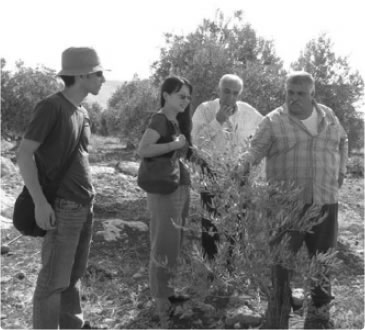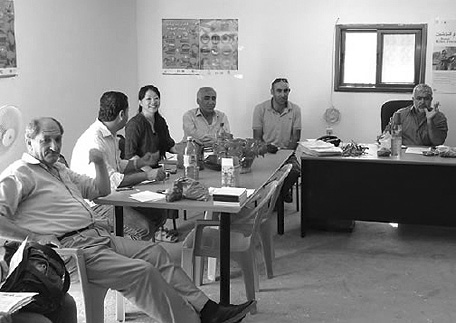Japan's Official Development Assistance White Paper 2011
Column 7
Mutual Understanding at the Grass-roots Level
— Assistance to Palestine Olive Farmers—

Olive cultivation training at a farmer's orchard (Ms. Yoshida second from left) (Photo: Mayumi Yoshida)
The olive is said to be a symbol of peace. Its origins can be traced back to Palestine, where it remains an essential part of the diet today. With uses extending to skin and hair care, the olive is linked closely with the Palestinian people's lives.
The low rainfall in Palestine makes it difficult to cultivate olives. Added to that, a pest called the olive fruit fly feeds on the olives and causes problems like decreased harvest or quality. Some 15,000 tons of olive oil are consumed in Palestine each year, but a good harvest might produce double that amount—the problem is that because the quality of the oil is bad, leftovers cannot be exported and they are simply thrown away.
Nippon International Cooperation for Community Development (NICCO), a non-governmental organization based in Japan(*1), has been working with the Japanese government since 2007 to assist poor olive farmers in the city of Tubas, located in the northeastern region of the West Bank of the Jordan River.
Mayumi Yoshida is a project manager at the NICCO Palestine office. She developed an interest in the issue of ethnic friction and conflict since her participation as a volunteer in a refugee assistance project in Kosovo, and was dispatched to Palestine in September 2007. She says, "Through the crop of olives, I hope not only to improve the lives of poor farmers but also deepen mutual understanding at the grass-roots level between peoples politically hostile to one another."
The first task Ms. Yoshida undertook was to produce high-quality olive oil. Her aim was to develop export channels and raise the farmers' income. For the women in farming families, she has also devised programs to develop and sell soap made of olive oil and other natural ingredients, and to manufacture and sell processed foods made of organic vegetables and olive oil, which help to both develop products and empower women. Before the project began, the farmers in Tubas did not care about quality standards, and the olive oil they produced was high in acidity and low in quality. Ms. Yoshida set out to raise the quality of their olive oil from cooking oil-level to fine, low-acidity, extra virgin-level, but she encountered many difficulties. For instance, she incorporated thorough training in hygiene control at olive oil extraction plants, where it was a matter of course for workers to do their job with a lighted cigarette in hand. She also reminded them over and over to remove branches and leaves, and extract the oil more slowly at a lower temperature, as all this makes a great difference in quality. The farmers had been extracting oil quickly at high temperatures for many years, and it took a long time to persuade them to accept the changes, but the quality of the olive oil improved steadily as a result.
The olive oil produced is now sold to even Israel and Saudi Arabia. "We have a relationship of trust with the Israelis who help our sales. They appreciate the quality and design of our products, and pay a fair price for them," says Mr. Dabak, a leader of the farmers' union that participates in Ms. Yoshida's cause. "At first, I couldn't understand why Japanese people, who don't cultivate olives, were training us. But through the project, we've learned that olive oil low in acidity is good for your health, and that we could make that good-quality oil as long as we followed the standards in our manufacturing process."
Ms. Yoshida says, "I hope the Palestinian people learn through this project that by building a sustainable cycle of cultivation, manufacturing, and sales, they can deepen their relationship of trust with the Jewish people in the private sector, and that even under occupation, through continuous efforts it is possible to improve their lives."
(*1) FY2007 Grant Assistance for Grass-roots Projects Partner
FY2010 Grant Assistance for Japanese NGO Projects Partner

Meeting with the farmers' union (Photo: Mayumi Yoshida)
